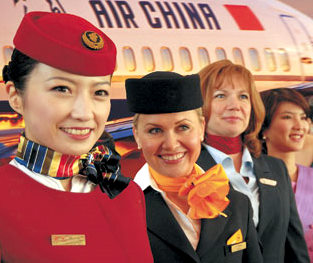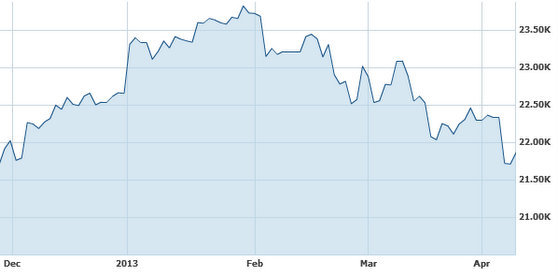Main reference: Story in Sinafinance
INVESTORS IN Hong Kong and the PRC are waking up each morning to find the bird flu virus in East China has spread a bit further afield.
Perhaps we should take a page from Warren Buffett’s quotes, as the famous investor once said that when the market panics, that’s when he steps in to make a killing.
The same could be said of the current avian flu outbreak in China, and investors shouldn’t overlook some golden opportunities.
 Unexpected Turbulence: Air China has been affected by the anxiety over bird flu in the PRC.
Unexpected Turbulence: Air China has been affected by the anxiety over bird flu in the PRC.
Photo: Air ChinaMost of us vividly recall the fear that gripped the markets in 1997 during the outbreak of avian flu -- just prior to the Asian Financial Tsunami that crippled economies in Seoul, Hong Kong, Bangkok and more.
Then, four years later in 2003, the deadly outbreak of SARS sent a wave of dread and panic from Taipei to Toronto – and from Beijing to Hong Kong.
And just as the world was slowly emerging from the Wall Street meltdown in 2008, the pig flu epidemic struck with a vengeance in 2009, putting a moderate global recovery in doubt given the outbreak’s severity in Mainland China and the region.
Each time the new contagion made its appearance, it was as if The Plague itself has arrived, and investors assumed the worst at the outset of each outbreak, selling off their “infected” holdings en masse.
But as can clearly be witnessed from these three episodic viral events, as soon as the disease began to slowly disappear – whether through natural burnout or human intervention – shareholder confidence just as quickly returned to pre-Plague levels.
Last Friday, the Hong Kong market received less than uplifting news on the spread of bird flu in Mainland China, and panic selling saw the benchmark Hang Seng Index plummet by over 600 points.
Cooler heads did not prevail the following Monday, despite the calming effect of a trade-free weekend, and anxiety over the development of the disease in the world’s No.2 economy continued to be the main talking point in investing circles.
In reality, any given market around the world will see investor panic rule the day when either the threat, or reality, of epidemic or war enters the conversation.
And with bird flu a reality at present, and the blustery rhetoric from North Korea becoming ever more strident, the perfect storm for psychological unease and investor panic is upon us.
However, as has been proven time and time again, when the initial panic has been digested by the market, reasonable investment sentiment takes over when the risk/reward calculus is more soberly assessed.
Getting a jumpstart on the panicky crowd is key to finding a way to make money during an external, non-financial-in-nature crisis – either real or potential.
China recently overtook the US and Germany to become the world’s biggest outbound tourist market.
 Hong Kong shares recent performance. Source: Yahoo Finance
Hong Kong shares recent performance. Source: Yahoo Finance
Within a few short years, the PRC is expected to see over 100 million of its citizens – equal to nearly a third of the US population – leave its borders each year to experience life outside China, if only for a few days.
That is a market that simply cannot be ignored, and those who do do so at their own peril.
This is especially true for travel-related shares in Hong Kong.
The recent turbulence for airlines listed in the Special Administrative Region including Air China (HK: 753), China Eastern (HK: 670) and China Southern (HK: 1055) is case in point.
China Eastern is particularly vulnerable as it is based in Shanghai -- the epicenter of the latest bird flu outbreak.
Following the SARS outbreak a decade ago, commercial carriers to and from the region were decimated as tourists and business travelers hunkered down at home to wait out the deadly disease.
Airline stocks nosedived, but those who bought in post-panic were soonafter back at cruising altitude – at least as far as share prices are concerned.
In addition, despite the growing independence and curiosity of a growing middle class of Chinese tourists, the propensity to travel in guided groups as part of package tours is still strong.
Therefore, the recent fall of tourism-related shares should not be seen as the beginning of a steady downward spiral.
Instead, panic selling should be a dinner bell for bargain hunters as the high-season for summer travel is fast approaching and Beijing’s efforts to tackle the latest bird flu outbreak are unprecedented in their thoroughness.
Also, the massive public campaign to educate the general populace on the need for better hygiene is making a strong case to buy into related shares like Vinda International (HK: 3331) and Hengan (HK: 1044).
See also:
If It Flies... PRC Airlines, Poultry Shares Hit By Bird Flu Fears






